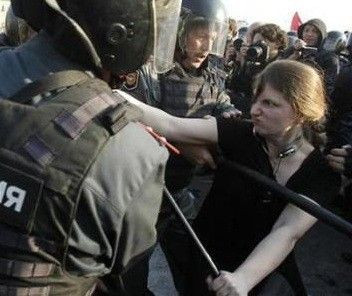Russian House Passes Controversial Protest Bill, Sparking Outrage From Opposition

It took Russia's upper house of parliament less than a day to approve a controversial new bill that increases fines on protesters 150-fold. The legislature was approved with a 132-1 vote after it passed through the Duma, Russia's lower house, on Tuesday afternoon. The bill now must be approved by President Vladimir Putin.
The proposed law increases fines on unsanctioned rallies and gatherings from 5,000 rubles ($160) to 300,000 rubles ($9,000), making civil disobedience more severely punishable than prostitution, storing nuclear materials or performing an abortion without medical qualification, according to the Associated Press.
Those organizing a protest without government permission face maximum fines of 1 million rubles, roughly $30,000, or up to three years in prison.
Activists and opposition parties say the bill violates Russia's constitution, which gives citizens of the Russian Federation the right to gather peacefully, without weapons, and to hold meetings, rallies, demonstrations, marches and pickets.
Around 20 protesters were arrested on Tuesday after the lower house passed the bill, including Sergei Mitrokhin, leader of the liberal Yabloko party. Under the new law, Mitrokhin will be prohibited from organizing any more protests because of his criminal record.
Surprisingly, Putin, whose former party United Russia sponsored the bill, said on Wednesday that he will not put his signature on the bill if it is not up to European democratic standards, adding that the law will need to be carefully studied in its final form.
Putin will be against in principle in one case -- if the law is contrary to the generally accepted laws typically used in other states protecting the rights of citizens and members of society, about which the law describes. We're talking about European countries where analogous laws exist, Putin's press secretary Dmitry Peskov told RIA Novosti.
Conceptually, Putin thinks this law, as in other European states, and other states in the world, should not inhibit democracy or the rights of citizens, but at the same time it must take into consideration and guarantee the rights and interests of all sections of society, he said.
The chairman of Russia's Presidential Human Rights Council, Mikhail Fedotov, has already condemned the bill as a mistake ... fraught with serious human rights violations and a deeper social conflict.
Additionally, a number of opposition parties boycotted the parliamentary vote, and some tried, unsuccessfully, to delay the vote by flooding the upper house with 400 new amendments to the bill, which were shot down in quick succession.
© Copyright IBTimes 2024. All rights reserved.





















